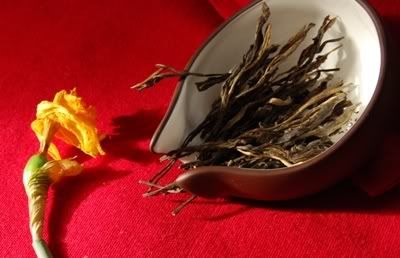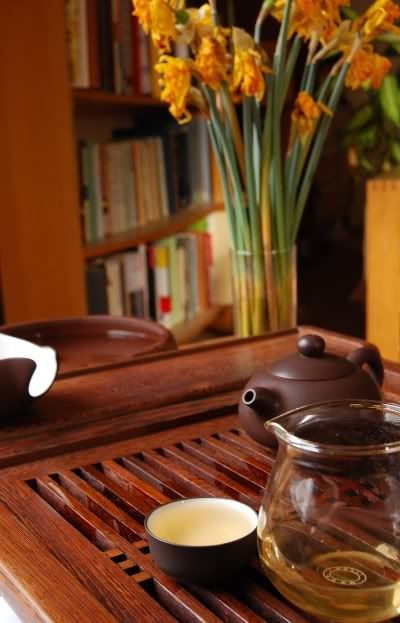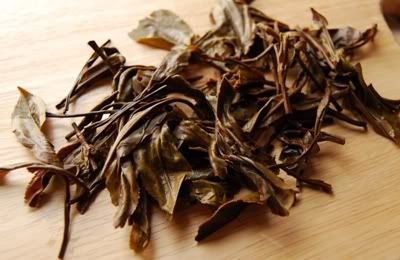I love maocha. It doesn't get a lot of press, perhaps because it's not the greatest tea to store (although the 1960s Gaoligongshan is a good, old maocha).
This tea was bought by TA (many thanks), from his local vendor in the Czech Republic. We know little about it, excepting the "yesheng" [wild] in its title, which makes me think of brutally astringent wild-tree leaves.
And what beautiful leaves they are...

This tea is "yin and yang". Its strong, "yang" element is its sensation: it is wonderfully thick and oily, it has effervescent energy on the tongue, it cools the mouth like mint, and it has a flushing chaqi.
It's "yin" element is its flavour and aroma: it is quiet and mushroom-like.
The strong sensations mark it out as a good quality tea. The gentle flavours are an unusual mix.

This tea responds well to excessive bullying: lots of leaves, very small quantities of water (my 10cl pot has half-filled), and long infusions. Pushing it hard extracts a good huigan and some decent flavour. Anything less than a firm hand and it is a bit too gentle.

I'm always in favour of good maocha, and this is good maocha. It didn't strike me as "yesheng" in its flavours, but it was certainly well-grown, as evinced from its sensations.
Thanks to TA for the sample - it's one of several interesting maocha to come...
This tea was bought by TA (many thanks), from his local vendor in the Czech Republic. We know little about it, excepting the "yesheng" [wild] in its title, which makes me think of brutally astringent wild-tree leaves.
And what beautiful leaves they are...

This tea is "yin and yang". Its strong, "yang" element is its sensation: it is wonderfully thick and oily, it has effervescent energy on the tongue, it cools the mouth like mint, and it has a flushing chaqi.
It's "yin" element is its flavour and aroma: it is quiet and mushroom-like.
The strong sensations mark it out as a good quality tea. The gentle flavours are an unusual mix.

This tea responds well to excessive bullying: lots of leaves, very small quantities of water (my 10cl pot has half-filled), and long infusions. Pushing it hard extracts a good huigan and some decent flavour. Anything less than a firm hand and it is a bit too gentle.

I'm always in favour of good maocha, and this is good maocha. It didn't strike me as "yesheng" in its flavours, but it was certainly well-grown, as evinced from its sensations.
Thanks to TA for the sample - it's one of several interesting maocha to come...

7 comments:
Your pictures bring me into the moment like I'm sitting across from you as you take the first sip. Good job with the new camera. Your simple and direct description of this tea made my mouth water.
Thanks.
Most kind, Matt. The new camera's turning out to be quite a bit of fun, once you tame all those strange photographic variables...
Toodlepip,
Hobbes
I really like the second picture... the focus and aperture value look just perfect.
-vl.
Only one question - how you fit such long leaves in small pot?
Dear Vlad,
High praise indeed from an accomplished photographer such as yourself!
Dear Tuochatea,
I'm glad you asked! I let them sit in some warm water in my chahe for a few moments, to soften them up, and then bent them carefully into the pot so that they didn't snap. I was going to mention that in the article, so thanks for asking. :)
Toodlepip,
Hobbes
Another great review and lovely pictures as always.
I have an ulterior motive in posting this comment, though-- some of us online tea enthusiasts have been getting WikiCha up and running over the past couple of days, and we'd be delighted if you had some spare time to contribute.
P.S. Even though you don't show your filter in those pictures, I know you used one. Freak. :)
G'day sir,
Thanks for the compliment! It put me in a great mood, and I read the excellent pages of WikiCha with an irritatingly smug, benign smile. I'd be happy to see what I can add!
Toodlepip,
Hobbes
P.s. Tea filters are for real men.
Post a Comment